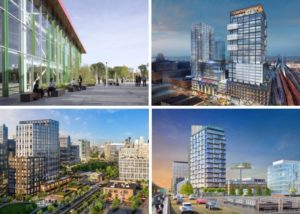
Clockwise from upper left: LINX Watertown, the Hub on Causeway, 7ink by Ollie and Cambridge Crossing.
Job growth in the life science and e-commerce sectors spurred some of the decade’s largest lease deals in Greater Boston during 2018, sweeping aside notions of a real estate cycle that’s run its course.
With available building sites vanishing in the Seaport District, development spread to fringe neighborhoods including the West End, Allston-Brighton and the South End. Ground-up condominium development staged a comeback in neighborhoods such as Allston and Jamaica Plain.
Boston officials ended years of study and approved a two-year compact living pilot that eliminates minimum square-footage requirements for apartments and condos. And new housing models emerged, such as National Development’s planned 7Ink by Ollie co-housing tower in South End and British developer Scape’s proposed 500-unit private student housing tower at 1252-1268 Boylston St. in the Fenway.
Cambridge Crossing Will Become the Next Big Job Cluster
Developers of a 45-year-old former rail yard on the Boston-Cambridge-Somerville border missed their chance to cash in on the last real estate cycle, with legal disputes delaying the 4.5-million-square-foot mixed-use project. A 2015 change of ownership – with San Francisco developer DivcoWest buying the NorthPoint parcels from Canyon Johnson Urban Funds for $291 million – served as catalyst for the first commercial development on the property. DivcoWest opted to break ground on the first office and lab building on speculation in 2017, and lured Philips North America as anchor tenant. With few availabilities in nearby Kendall Square for life science companies to grow, French drugmaker Sanofi Genzyme in December agreed to consolidate 4,700 employees from various Greater Boston locations by leasing 900,000 square feet in two office buildings scheduled to break ground in 2019.

Steve Adams
A Tech Hub Rises Above North Station
Two of the most powerful trends in commercial real estate are the popularity of transit-oriented developments and the migration of suburban tech companies to downtown offices. The forces combined at North Station, where Boston Properties gained approvals in 2013 for a 1.9-million-square-foot development. Verizon Communications in July leased 439,000 square feet for a new tech hub, including five floors that it will set aside for incubators and business partners. Real estate sources say all the office space in the distinctive 525,000-square-foot tower is now spoken for, with Wakefield-based data marketers Epsilon possibly leasing the rest of the space. Online security firm Rapid7 earlier leased the bulk of the space in the 181,000-square-foot office podium building which opens in 2019.
Amazon Isn’t Shipping Up to Boston For HQ2
Even as it launched a nationwide search for an 8-million-square-foot second headquarters, e-commerce leader Amazon rapidly expnded its workforce in Boston’s Seaport District by occupying a new 153,000-square-foot office at 253 Summer St. and agreeing to lease 430,000 square feet in a new building scheduled for completion in 2021 by WS Development. The two facilities could house nearly 3,000 employees, augmenting Amazon’s existing Cambridge offices, which opened in 2012. Amazon ultimately surprised observers by splitting its HQ2 plans between Queens, New York and Crystal City, Virginia. New York’s incentive package alone could top $2.8 billion, but Tom Murphy, a former Pittsburgh mayor and Urban Land Institute senior resident fellow, said the overriding factor was the quality of local workforces and urban amenities. While Amazon didn’t see Boston as a good fit for HQ2, it clearly sees the region as an important tech base.
“General Electric made a choice to move from suburban Connecticut to downtown Boston in large part because they were chasing talent,” Murphy said.
Meanwhile, Boston’s homegrown e-commerce giant, Wayfair, continued its aggressive growth in Back Bay, leasing 300,000 square feet at 10 St. James Ave. in December on top of 395,000 square feet at 500 Boylston-222 Berkeley St. in July.
Developers Grab Land on Red Line Corridor
After its successful development of Ink Block in the South End, National Development is looking to South Boston’s industrial Dorchester Avenue corridor for the next big opportunity. The Newton-based firm paid nearly $111 million in September for construction equipment vendor Marr Cos.’ 4.3-acre properties. The parcels are part of a 144-acre district expected to be rezoned for mixed-use development and towers up to 300 feet near the MBTA’s Broadway and Andrew stations. After transforming the Fenway neighborhood with luxury housing and new Class A office space, Samuels & Assoc. is also bullish on the Andrew Square area. It joined Boston-based Core Investments’ development team in September for the $400 million Washington Village project, originally approved in 2016. Plans call for 656 condos and apartments and 100,000 square feet of retail space in nine buildings ranging up to 21 stories.
Life Science Spreads its Footprint
East Cambridge wasn’t the only submarket to benefit from the life science industry’s steady growth. Traditional relief valves such as Alewife and Lexington continued to attract demand, with projects such as The Davis Cos.’ speculative Alewife Research Center attracting tenants ahead of completion. But it was a speculative industrial-to-lab conversion in Watertown that one commercial broker described as “the comp that shocked the world.” Boylston Properties sold its fully leased LINX complex to Clarion Partners for $157.6 million, or $852 per square foot. In nearby Allston, life science developer King Street Properties and Mugar Enterprises will test the market for 539,400 square feet of office and lab space at NEXUS, proposed for the Stadium Auto Body property. And lab conversions are increasingly viewed as the best strategy for tired suburban office buildings. Hilco Real Estate is reportedly considering a lab conversion for part of the 440,000-square-foot CenterPoint complex in Waltham. More institutional investors are including lab space in their acquisition strategies, giving developers more confidence of a successful exit.
Few Big Office Blocks Left in Boston
Office tenants looking for more than 250,000 square feet of contiguous space in Boston have only one building to consider in the short term: 601 Congress St., as Manulife relocates to Back Bay. The space crunch reflects another big year for the office market, with 2 million square feet of positive absorption in Boston according to research by Colliers International Boston. Barring a rapid falloff in demand, the tight market sets the stage to kickstart several big projects waiting for an anchor tenant to break ground, including HYM Investment Group’s 1-million-square-foot One Congress tower at Bulfinch Crossing and The Abbey Group’s 1.6-million-square-foot Exchange South End.
Let’s Get Small: Boston OKs Microapartments
A land-starved city with aging housing stock, Boston approved changes to its requirements for new condos and apartments. A two-year pilot compact living policy eliminates minimum square-footage for units in new developments and does away with parking requirements for new housing near public transit. Private developers are testing new prototypes reflecting the trend toward smaller households and delayed family formation. National Development’s 7Ink by Ollie tower in South End will incorporate elements of hotel living, such as furnished residences and housekeeping service. London-based academic housing developer Scape made a splash in announcing plans for a $1 billion development pipeline in Boston, including a 500-unit tower at 1252-1268 Boylston St. in the Fenway.





